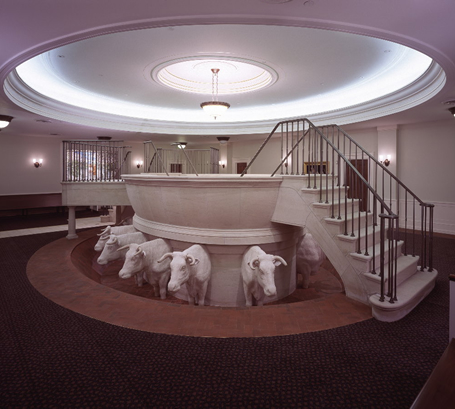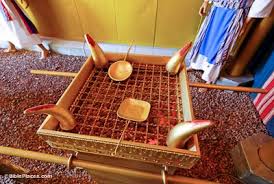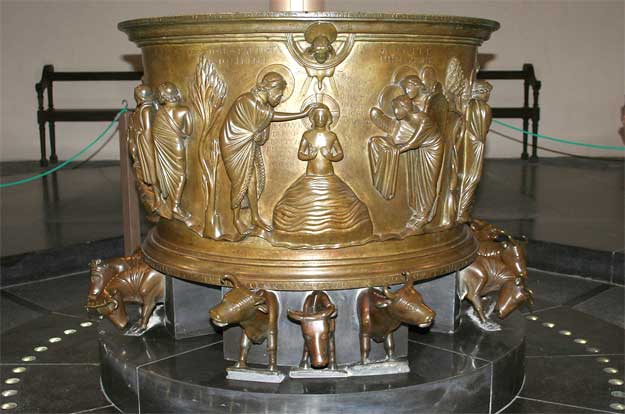136. Significant Perspective of the Horns of the Altar
It will come to be known that the horns of the
altar where the horns of the 'unicorn' or 'wild ox' of Ephraim. They were they which
symbolized the sacrifical animal the 'bullvine' heffer which is symbolically representing
the atonement of the Messiah, the Messiah, and that the Messiah was of the tribe of
Ephraim. Thus keeping in mind that it is upon the 'horns of the bullock' that the
sins of men are remitted it becomes very significant in may ways respecting the mission
and processes of the Lord Jesus Christ and the fulfillment of His Gospel Plan. Consider
anew that blessing bestowed upon the head of those of Joseph by Moses in Deuteronomy.
"Let the blessing come upon the head of Joseph, and upon the top of the
head of him that was separated from his brethern. His glory is like the firstling of
his bullock, and his horns are like the horns of unicorns [wild ox]: with them he shall
push the people together to the ends of the earth: and they are the ten thousands of
Ephraim and they are the thousands of Mannasseh." ~ Deuteronomy 33:16-17
In applying this concept to the in-gathering and gathering of Israel from the nations
of the earth to the end of fulfilling the covenant of Abraham, that through his seed
the nations of the earth will be blessed; it seems quite apparent that it is Ephraim
assisted by Menasseh, the two blessed sons of Joseph, who are to full fill the covenant
of Abraham. That Covenant is the very Covenant of the Fathers which Abraham did seek
when he did seek after the blessing of the fathers (Abraham 1:1-4). And it include the
blessing in respect to 'the seed', which was that seed of woman that would crush the
head of Satan and redeem all of God's children. He is the same as Jesus Christ so
fully associated with Ephraim and the seed of Abraham, the promised and blessed seed,
even Messiah ben Joseph/Ephraim as well as Messiah ben David—one in the same.
 YES the latter-day gathering and filling the earth envisioned by Daniel is universal,
unto every nation, kindred, tongue and people who ever have, do,
and will live upon the face of the earth under the creation of Jehovah under the
direction of his Father Elohim (John 1:1-4 & Eusebius EHC Book I, chapter 2:1-3).
And that gathering unto Christ of the blessing of all the nations of the earth
according to the covenant blessing of Abraham significantly rests on the back of the
symbolic oxen of the tribe of Ephraim as held by the baptismal fonts* of the LDS
Temples. And those temples' work for the dead which will continue on through the
1,000 year millennium until all the work has been done for everyone. It is a testament
to the universal salvation of Jesus Christ and how it will work in reference to Jesus'
teaching that everyone must be born of the water (baptism) and of the spirit, or else
they can not enter into the Kingdom of Heaven (John 3:5). These are the 'unicorns' of Ephraim
and Jesus Christ, even Messiah ben Ephraim - David - Joseph. Note: The LDS (Mormons)
are the only Christians who believe in salvation for the death through baptism for
the dead (1 Corinthians 15:29). [Nauvoo Temple Baptism Font - LDS Temple]
YES the latter-day gathering and filling the earth envisioned by Daniel is universal,
unto every nation, kindred, tongue and people who ever have, do,
and will live upon the face of the earth under the creation of Jehovah under the
direction of his Father Elohim (John 1:1-4 & Eusebius EHC Book I, chapter 2:1-3).
And that gathering unto Christ of the blessing of all the nations of the earth
according to the covenant blessing of Abraham significantly rests on the back of the
symbolic oxen of the tribe of Ephraim as held by the baptismal fonts* of the LDS
Temples. And those temples' work for the dead which will continue on through the
1,000 year millennium until all the work has been done for everyone. It is a testament
to the universal salvation of Jesus Christ and how it will work in reference to Jesus'
teaching that everyone must be born of the water (baptism) and of the spirit, or else
they can not enter into the Kingdom of Heaven (John 3:5). These are the 'unicorns' of Ephraim
and Jesus Christ, even Messiah ben Ephraim - David - Joseph. Note: The LDS (Mormons)
are the only Christians who believe in salvation for the death through baptism for
the dead (1 Corinthians 15:29). [Nauvoo Temple Baptism Font - LDS Temple]
Understanding the Temple Symbolic Sacrifice
 And the gathering will be from the (4) four corners of the earth as so represented
on the altar of the temple and tabernacle (the portable temple). In both the
in-gatherings and the more general gatherings throughout the world to the four
corners of the world, by which the stone cut out of the mountain will fill the earth,
the horns of the alter are significantly placed at the four corners of the temple
alter upon which the blood of the atonement sacrifice is placed upon the four horns
(Ex. 29:12, 30:10; Lev. 4:7, 18, 25, 30, 34; Lev. 8:15, 9:9, 16:18; Ezek. 43:20; see
blood 'sprinkle/sprinkled as well). In particular this is done on the 'Day of Atonement'
and as the 'sin offering' which is the blood of the scarifice, that of Jesus Christ,
being symbolically weightedly placed upon the 'horns of the bullock (unicorn, wild ox,
red heffer) of Ephraim which rests upon Jesus Christ, even Messiah ben Joseph/Ephraim.
And the gathering will be from the (4) four corners of the earth as so represented
on the altar of the temple and tabernacle (the portable temple). In both the
in-gatherings and the more general gatherings throughout the world to the four
corners of the world, by which the stone cut out of the mountain will fill the earth,
the horns of the alter are significantly placed at the four corners of the temple
alter upon which the blood of the atonement sacrifice is placed upon the four horns
(Ex. 29:12, 30:10; Lev. 4:7, 18, 25, 30, 34; Lev. 8:15, 9:9, 16:18; Ezek. 43:20; see
blood 'sprinkle/sprinkled as well). In particular this is done on the 'Day of Atonement'
and as the 'sin offering' which is the blood of the scarifice, that of Jesus Christ,
being symbolically weightedly placed upon the 'horns of the bullock (unicorn, wild ox,
red heffer) of Ephraim which rests upon Jesus Christ, even Messiah ben Joseph/Ephraim.
The Symbolic Appeal for Mercy & Refuge
In addition, it will be found signicant that both Joab (1 Kings 2:28-29) and Adonijah
(1 Kings 1:49-51) did flee to the temple and grab the horn of the altar, those horns of
the Messiah, not only to claim their innocence before God and for a refuge (Exodus
21:12-14; Psalm 18:2 - 2 Samuel 22:2) against death, but further significant in their
attempt was that like David and Solomon, both Adonijah and Joab also had a claim unto
the descent of Ephraim of through Oben and Jesse of the birthright promised Messiah
ben Epharim and not merely that so associated with Judah. So was Joab free from guilt
in the slaying of Absalom (murder)? Certainly Absalom was guilty of ursurping to being
king and replacing his father David, but David didn't seem to consider it a service as
he sorrowed for the death of his son Absalom despite of his rebellion. So David
committed Solomon to kill Joab. I suppose it is left to the Lord to sort that out and
who is exactly 'responsible' for the killing of who in that matter.
 * NOTE: The LDS are not the only Christians who have their baptismal font on the backs
of 12 Oxen. This 12 century (1100s) baptismal font is of Renier de Huy, Liege (Belgium),
St. Barhelemy (Bartholomew). The ancient 'molten sea' was ten cubits from brim to
brim with a height of five cubits. It had a circumphrance of about thirty cubits. And
it stood upon twelve oxen, again the symbol of the tribe of Ephraim. Of the oxen,
three each looked north, south, eact and west (1 Kings 7:23-26). That is presumably
toward the four corners of quarters of the earth. And again the symbolism is
significant to the Messiah and the gathering of Israel or the nations of the earth
into the gospel of Jesus Christ. While one current thought is that the 12 oxen represent
the 12 tribes, it ought to be admended here to mean all those who come into Israel,
including the 12 tribes, by way and upon the backs of Ephraim, which further is upon
the back of Messiah ben Ephraim - Jesus Christ.
* NOTE: The LDS are not the only Christians who have their baptismal font on the backs
of 12 Oxen. This 12 century (1100s) baptismal font is of Renier de Huy, Liege (Belgium),
St. Barhelemy (Bartholomew). The ancient 'molten sea' was ten cubits from brim to
brim with a height of five cubits. It had a circumphrance of about thirty cubits. And
it stood upon twelve oxen, again the symbol of the tribe of Ephraim. Of the oxen,
three each looked north, south, eact and west (1 Kings 7:23-26). That is presumably
toward the four corners of quarters of the earth. And again the symbolism is
significant to the Messiah and the gathering of Israel or the nations of the earth
into the gospel of Jesus Christ. While one current thought is that the 12 oxen represent
the 12 tribes, it ought to be admended here to mean all those who come into Israel,
including the 12 tribes, by way and upon the backs of Ephraim, which further is upon
the back of Messiah ben Ephraim - Jesus Christ.